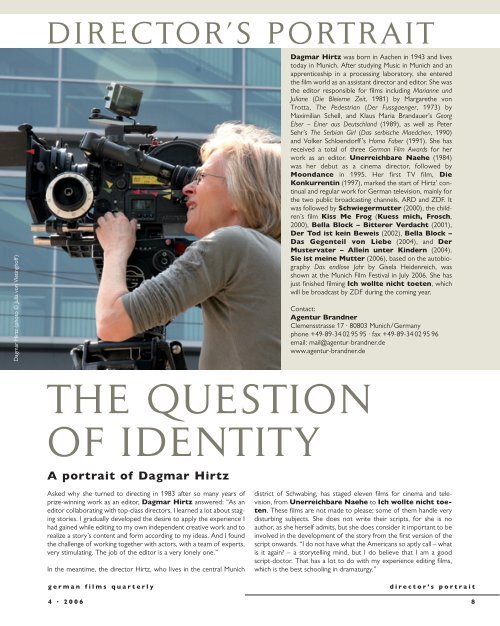Quarterly 4 · 2006 - German Cinema
Quarterly 4 · 2006 - German Cinema
Quarterly 4 · 2006 - German Cinema
Create successful ePaper yourself
Turn your PDF publications into a flip-book with our unique Google optimized e-Paper software.
Dagmar Hirtz (photo © Julia von Vietinghoff)<br />
DIRECTOR’S PORTRAIT<br />
Dagmar Hirtz was born in Aachen in 1943 and lives<br />
today in Munich. After studying Music in Munich and an<br />
apprenticeship in a processing laboratory, she entered<br />
the film world as an assistant director and editor. She was<br />
the editor responsible for films including Marianne und<br />
Juliane (Die Bleierne Zeit, 1981) by Margarethe von<br />
Trotta, The Pedestrian (Der Fussgaenger, 1973) by<br />
Maximilian Schell, and Klaus Maria Brandauer’s Georg<br />
Elser – Einer aus Deutschland (1989), as well as Peter<br />
Sehr’s The Serbian Girl (Das serbische Maedchen, 1990)<br />
and Volker Schloendorff ’s Homo Faber (1991). She has<br />
received a total of three <strong>German</strong> Film Awards for her<br />
work as an editor. Unerreichbare Naehe (1984)<br />
was her debut as a cinema director, followed by<br />
Moondance in 1995. Her first TV film, Die<br />
Konkurrentin (1997), marked the start of Hirtz’ continual<br />
and regular work for <strong>German</strong> television, mainly for<br />
the two public broadcasting channels, ARD and ZDF. It<br />
was followed by Schwiegermutter (2000), the children’s<br />
film Kiss Me Frog (Kuess mich, Frosch,<br />
2000), Bella Block – Bitterer Verdacht (2001),<br />
Der Tod ist kein Beweis (2002), Bella Block –<br />
Das Gegenteil von Liebe (2004), and Der<br />
Mustervater – Allein unter Kindern (2004).<br />
Sie ist meine Mutter (<strong>2006</strong>), based on the autobiography<br />
Das endlose Jahr by Gisela Heidenreich, was<br />
shown at the Munich Film Festival in July <strong>2006</strong>. She has<br />
just finished filming Ich wollte nicht toeten, which<br />
will be broadcast by ZDF during the coming year.<br />
Contact:<br />
Agentur Brandner<br />
Clemensstrasse 17 <strong>·</strong> 80803 Munich/<strong>German</strong>y<br />
phone +49-89-34 02 95 95 <strong>·</strong> fax +49-89-34 02 95 96<br />
email: mail@agentur-brandner.de<br />
www.agentur-brandner.de<br />
THE QUESTION<br />
OF IDENTITY<br />
A portrait of Dagmar Hirtz<br />
Asked why she turned to directing in 1983 after so many years of<br />
prize-winning work as an editor, Dagmar Hirtz answered: “As an<br />
editor collaborating with top-class directors, I learned a lot about staging<br />
stories. I gradually developed the desire to apply the experience I<br />
had gained while editing to my own independent creative work and to<br />
realize a story’s content and form according to my ideas. And I found<br />
the challenge of working together with actors, with a team of experts,<br />
very stimulating. The job of the editor is a very lonely one.”<br />
In the meantime, the director Hirtz, who lives in the central Munich<br />
district of Schwabing, has staged eleven films for cinema and television,<br />
from Unerreichbare Naehe to Ich wollte nicht toeten.<br />
These films are not made to please; some of them handle very<br />
disturbing subjects. She does not write their scripts, for she is no<br />
author, as she herself admits, but she does consider it important to be<br />
involved in the development of the story from the first version of the<br />
script onwards. “I do not have what the Americans so aptly call – what<br />
is it again? – a storytelling mind, but I do believe that I am a good<br />
script-doctor. That has a lot to do with my experience editing films,<br />
which is the best schooling in dramaturgy.”<br />
german films quarterly director’s portrait<br />
4 <strong>·</strong> <strong>2006</strong> 8
















